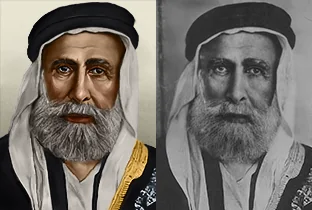Sharif Hussein bin Ali, a towering figure in Arab history, left an indelible mark on the region. Descendant of the Prophet Muhammad through the Hashemite dynasty, he served as the Sharif (guardian) of Mecca from 1908 and later King of Hejaz. His legacy is deeply intertwined with the rise of Arab nationalism and the tumultuous breakup of the Ottoman Empire.
From Sharif to Leader of Revolt:
Initially appointed by the Ottomans, Hussein’s relationship with the Empire soured with the rise of the Young Turks and their increasingly nationalistic policies. He saw their Pan-Turkic ideology as a threat to Arab identity and autonomy. Fueled by these concerns and promises of Arab independence from the British, Hussein fearlessly spearheaded the Great Arab Revolt in 1916. This audacious uprising, with his sons leading guerilla campaigns aided by the iconic black Arab Revolt flag, aimed to dismantle Ottoman rule and establish a unified Arab nation.
A Dream Deferred:
While the revolt succeeded in disrupting Ottoman control, the dream of a united Arab state remained elusive. The Sykes-Picot Agreement, a secret pact between Britain and France, carved up the region into spheres of influence, dashing Hussein’s pan-Arab aspirations. Although he briefly proclaimed himself Caliph after the Ottoman Caliphate’s abolition, his reign in Hejaz proved short-lived. The rising power of Ibn Saud and the Saudis ultimately led to Hussein’s exile.
Enduring Impact:
Despite the unfulfilled dream of a unified Arab nation, Sharif Hussein’s legacy continues to resonate. He is considered the “father of modern pan-Arabism,” inspiring generations of Arab leaders who fought for self-determination. His role in the revolt also paved the way for establishing the Hashemite Kingdom of Jordan, ruled by his descendants to this day. Sharif Hussein bin Ali’s story serves as a potent reminder of the complex forces that shaped the modern Middle East and the ongoing struggle for Arab identity and unity.
A Controversial Legacy:
Sharif Hussein’s legacy is not without its complexities. His critics argue that he was naive in trusting British promises and that his focus on pan-Arabism overshadowed the needs of his own people in Hejaz. Additionally, the brutal tactics employed by some of his followers during the revolt tarnished the image of the uprising.
A Pivotal Figure:
However, these criticisms cannot diminish the significance of his actions. Sharif Hussein bin Ali’s story serves as a potent reminder of the complex forces that shaped the modern Middle East. His leadership during the Arab Revolt marked a pivotal moment in the region’s history, and the ongoing struggle for Arab identity and unity continues to echo his dream of a unified Arab nation.
Sharif Hussein bin Ali’s life and legacy offer a window into a critical turning point for the Arab world. His rise from Sharif of Mecca to leader of the Arab Revolt solidified his place as a champion of Arab nationalism. While the dream of a unified Arab state under his leadership remained unrealized, his actions shattered the Ottoman hold on the region and paved the way for the creation of modern Arab nations. The debate surrounding his decisions continues, but there’s no denying the profound impact he had on the course of Arab history. Sharif Hussein bin Ali’s story serves as a potent reminder of the enduring power of ideals, the complexities of leadership in a turbulent era, and the ongoing quest for Arab unity and self-determination in the modern Middle East.
